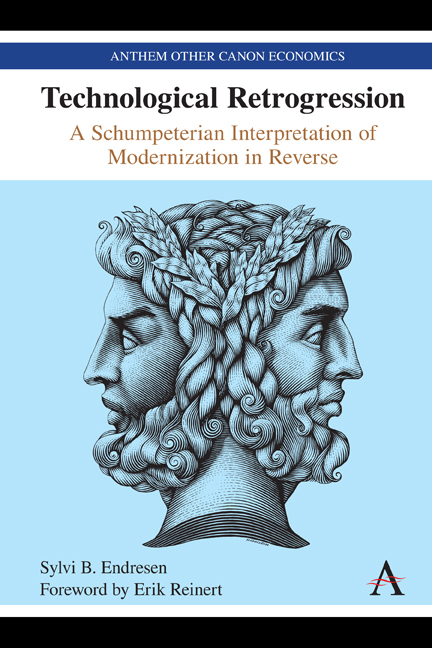Book contents
- Frontmatter
- Dedication
- Contents
- List of Figures
- Foreword
- Acknowledgements
- Preface: The Book within This Book
- Introduction: The Concept of Technological Retrogression
- 1 Challenging Linearity and Irreversibility
- 2 Perspectives on Technological Heterogeneity
- 3 Production Systems and Work Histories
- 4 Empirical Evidence of Technological Retrogression: The Sri Lankan Case
- 5 Empirical Evidence of Technological Retrogression: The Malaysian Case
- 6 A Theory of Technological Retrogression
- References
- Index
Introduction: The Concept of Technological Retrogression
Published online by Cambridge University Press: 17 June 2021
- Frontmatter
- Dedication
- Contents
- List of Figures
- Foreword
- Acknowledgements
- Preface: The Book within This Book
- Introduction: The Concept of Technological Retrogression
- 1 Challenging Linearity and Irreversibility
- 2 Perspectives on Technological Heterogeneity
- 3 Production Systems and Work Histories
- 4 Empirical Evidence of Technological Retrogression: The Sri Lankan Case
- 5 Empirical Evidence of Technological Retrogression: The Malaysian Case
- 6 A Theory of Technological Retrogression
- References
- Index
Summary
Point of departure
On any working day in many coastal Third World countries, big, busy trawlers may be observed on their way to deep- sea fishing grounds, as they pass a fleet of small wooden crafts, being ignored by the patiently rowing fishermen aboard. Faced with this striking contrast between high- and low- productive methods of fishing, most observers infer that modern times are coming; the days of picturesque fishing methods are counted. The basis of the inference that traditional fisheries are dying is – of course – the historical experience of fisheries’ industries of developed nations over the past century. What can be learned from history is, however, limited, and what can be learned by studying patterns formed by production equipment dispersed on the surface of the sea is even less. The above snapshot provides us with information on the situation today. The investigation of diffusion of technologies in a few Asian fishing villages has taught me that the past may be as hidden as the future.
Sitting in a Colombo café in 1980, reading a Sri Lankan newspaper article treating the ‘Catamaran's dramatic come- back’, my curiosity on retrogression processes was roused and my investigation started. The catamaran, which according to Norwegian standards is (wrongly) considered a primitive craft, was said to experience a renaissance on the north- western coast of the island:
The weatherbeaten old hoboes of the sea – the traditional catamaran – which had more or less been elbowed out by mechanized fishing craft, have made a dramatic come- back to Negombo's beaches. With the advent of the three- and- a- half ton fishing boats and plastic craft with outboard motors, it looked as if it would be the end of road for the old outriggers. But now the fishermen with mechanized crafts are faced with the high price of fuel and do not venture out as much as they used to […] A number of the fishermen who operated mechanized crafts have now turned to the old dug- outs again in an endeavour to beat the fuel crisis. (Karunaratne 1979)
Information
- Type
- Chapter
- Information
- Technological RetrogressionA Schumpeterian Interpretation of Modernization in Reverse, pp. 1 - 10Publisher: Anthem PressPrint publication year: 2021
